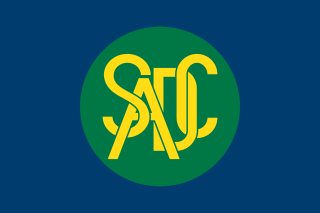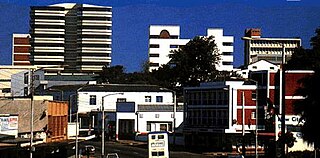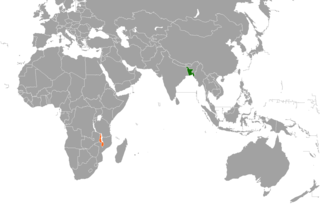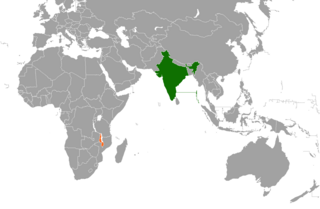Related Research Articles

Malawi, officially the Republic of Malawi, is a landlocked country in southeastern Africa that was formerly known as Nyasaland. It is bordered by Zambia to the west, Tanzania to the north and northeast, and Mozambique surrounding on the east, south and southwest. Malawi spans over 118,484 km2 (45,747 sq mi) and has an estimated population of 18,143,217. Lake Malawi, also known as Lake Nyasa, takes up about a third of Malawi's area. Its capital is Lilongwe, which is also the country's largest city; the second largest is Blantyre, the third largest is Mzuzu and the fourth largest is its old capital Zomba. The name Malawi comes from the Maravi, an old name of the Chewa people who inhabit the area. The country is nicknamed "The Warm Heart of Africa" because of the friendliness of its people.
The History of Malawi covers the area of present-day Malawi. The region was once part of the Maravi Empire. In colonial times, the territory was ruled by the British, under whose control it was known first as British Central Africa and later Nyasaland. It became part of the Federation of Rhodesia and Nyasaland. The country achieved full independence, as Malawi, in 1964. After independence, Malawi was ruled as a one-party state under Hastings Banda until 1994.

The economy of Malawi is predominantly agricultural, with about 80% of the population living in rural areas. The landlocked country in south central Africa ranks among the world's least developed countries. In 2017, agriculture accounted for about one-third of GDP and about 80% of export revenue. The economy depends on substantial inflows of economic assistance from the IMF, the World Bank, and individual donor nations. The government faces strong challenges: to spur exports, to improve educational and health facilities, to face up to environmental problems of deforestation and erosion, and to deal with the problem of HIV/AIDS in Africa.

Malawi's former President Bakili Muluzi continued the pro-Western foreign policy established by his predecessor, Hastings Banda. It maintains excellent diplomatic relations with principal Western countries. Malawi's close relations with South Africa throughout the apartheid era strained its relations with other African nations. Following the collapse of apartheid in 1994, Malawi developed, and currently maintains, strong diplomatic relations with all African countries.

Lilongwe is the capital and most populated city of the African country of Malawi. It has a population of 989,318 as of the 2018 Census, up from a population of 674,448 in 2008. In 2020 that figure was 1,122,000. The city is located in the central region of Malawi, in the district of the same name, near the borders with Mozambique and Zambia, and it is an important economic and transportation hub for central Malawi. It is named after the Lilongwe River.

The British Central Africa Protectorate (BCA) was a British protectorate proclaimed in 1889 and ratified in 1891 that occupied the same area as present-day Malawi: it was renamed Nyasaland in 1907. British interest in the area arose from visits made by David Livingstone from 1858 onward during his exploration of the Zambezi area. This encouraged missionary activity that started in the 1860s, undertaken by the Universities' Mission to Central Africa, the Church of Scotland and the Free Church of Scotland, and which was followed by a small number of settlers. The Portuguese government attempted to claim much of the area in which the missionaries and settlers operated, but this was disputed by the British government. To forestall a Portuguese expedition claiming effective occupation, a protectorate was proclaimed, first over the south of this area, then over the whole of it in 1889. After negotiations with the Portuguese and German governments on its boundaries, the protectorate was formally ratified by the British government in May 1891.

The Southern African Development Community (SADC) is an inter-governmental organization headquartered in Gaborone, Botswana. Its goal is to further socio-economic cooperation and integration as well as political and security cooperation among 16 southern African countries.

Blantyre is Malawi's centre of finance and commerce, and its second largest city, with an enumerated 800,264 inhabitants as of 2018. It is sometimes referred to as the commercial and industrial capital of Malawi as opposed to the political capital, Lilongwe. It is the capital of the country's Southern Region as well as the Blantyre District.

Bingu wa Mutharika was a Malawian politician and economist who was President of Malawi from May 2004 until his death in April 2012. He was also President of the Democratic Progressive Party, which he founded in February 2005; it obtained a majority in Malawi's parliament in the 2009 general election. During his two terms in office, he was noted for being the Chairperson of the African Union in 2010–2011, as well as for several domestic controversies. In 2009, he purchased a private presidential jet for $13.26 million. This was followed almost immediately by a nationwide fuel shortage which was officially blamed on logistical problems, but was more likely due to the hard currency shortage caused by the freezing of aid by the international community He died in office from a cardiac arrest on 5 April 2012, at age 78.

The Southern Africa-Indian Ocean Division (SID) of Seventh-day Adventists is a sub-entity of the General Conference of Seventh-day Adventists, which coordinates the Church's activities in the southern portion of Africa, which include the nations of Angola, Ascension Island, Botswana, Comoro Islands, Lesotho, Madagascar, Malawi, Mauritius, Mozambique, Namibia, Réunion, São Tomé and Príncipe, Seychelles, South Africa, Swaziland, Zambia, Zimbabwe; as well as St. Helena and Tristan da Cunha, territories of the United Kingdom, and the Kerguelen Islands, territory of France. Its headquarters is in Johannesburg, South Africa. The Division membership as of June 30, 2018 is 3,969,099.
This page list topics related to Malawi.
The Alliance for Democracy is a political party in Malawi that marked its history as laying the foundation for multi-party rule in Malawi. It began as an underground political movement during the Kamuzu Banda era and later evolved to a political party during the multi-party era under the leadership of trade union activist, Chakufwa Chihana. AFORD has a stronghold in the northern region. The president is Godfrey Shawa.
The individual member states of the African Union (AU) coordinate foreign policy through this agency, in addition to conducting their own international relations on a state-by-state basis. The AU represents the interests of African peoples at large in intergovernmental organizations (IGO's); for instance, it is a permanent observer at the United Nations' General Assembly.
Chakufwa Chihana was a Malawian human rights activist, pro-democracy advocate, trade unionist and later, politician. He held the post of Second Vice President in Malawi, under President Bakili Muluzi. He is often called the 'father of Malawian democracy'. He served as leader of Malawi's first underground political movement, which urged President Hastings Kamuzu Banda, who had ruled for three decades, to call for a referendum on political pluralism. He was awarded the Robert F. Kennedy Human Rights Award in 1992.
Malawi Cricket Union is the official governing body of the sport of cricket in Malawi for both the men's and women's national teams. Its current headquarters is in Blantyre, Malawi. Malawi Cricket Union is Malawi's representative at the International Cricket Council (ICC) and is an associate member and has been a member of that body since 1998. It is also a member of the African Cricket Association. The association was suspended by the ICC in 2011, before it was lifted in 2014.

Cannabis in Malawi is prohibited for recreational use, but remains a popular drug and is produced for domestic use in Malawi and international export. In Chichewa, it is locally known as chamba. Chamba is grown mainly in central and northern regions like Mzuzu.

Visitors to Malawi must obtain a visa from one of the Malawian diplomatic missions unless they come from one of the visa exempt countries or countries eligible for visa on arrival.

Bangladesh–Malawi relations are the bilateral relations between Bangladesh and Malawi. Neither country has a resident ambassador. Diplomatic relations between the two countries were officially established in 2012 primarily due to former Malawian President Bingu wa Mutharika's desire to build strong relations with Bangladesh. Both the countries are members of Group of 77 and Commonwealth of Nations.

India–Malawi relations refers to the international relations that exist between India and Malawi.

Malawi–Turkey relations are foreign relations between Malawi and Turkey. The Turkish ambassador in Lusaka, Zambia is also accredited to Malawi. Malawi is accredited to Turkey from its embassy in Berlin, Germany. Turkey has plans to open an embassy in Lilongwe.
References
- ICTUR; et al., eds. (2005). Trade Unions of the World (6th ed.). London, UK: John Harper Publishing. ISBN 0-9543811-5-7.
| This Malawi-related article is a stub. You can help Wikipedia by expanding it. |
| This article related to an African trade union is a stub. You can help Wikipedia by expanding it. |